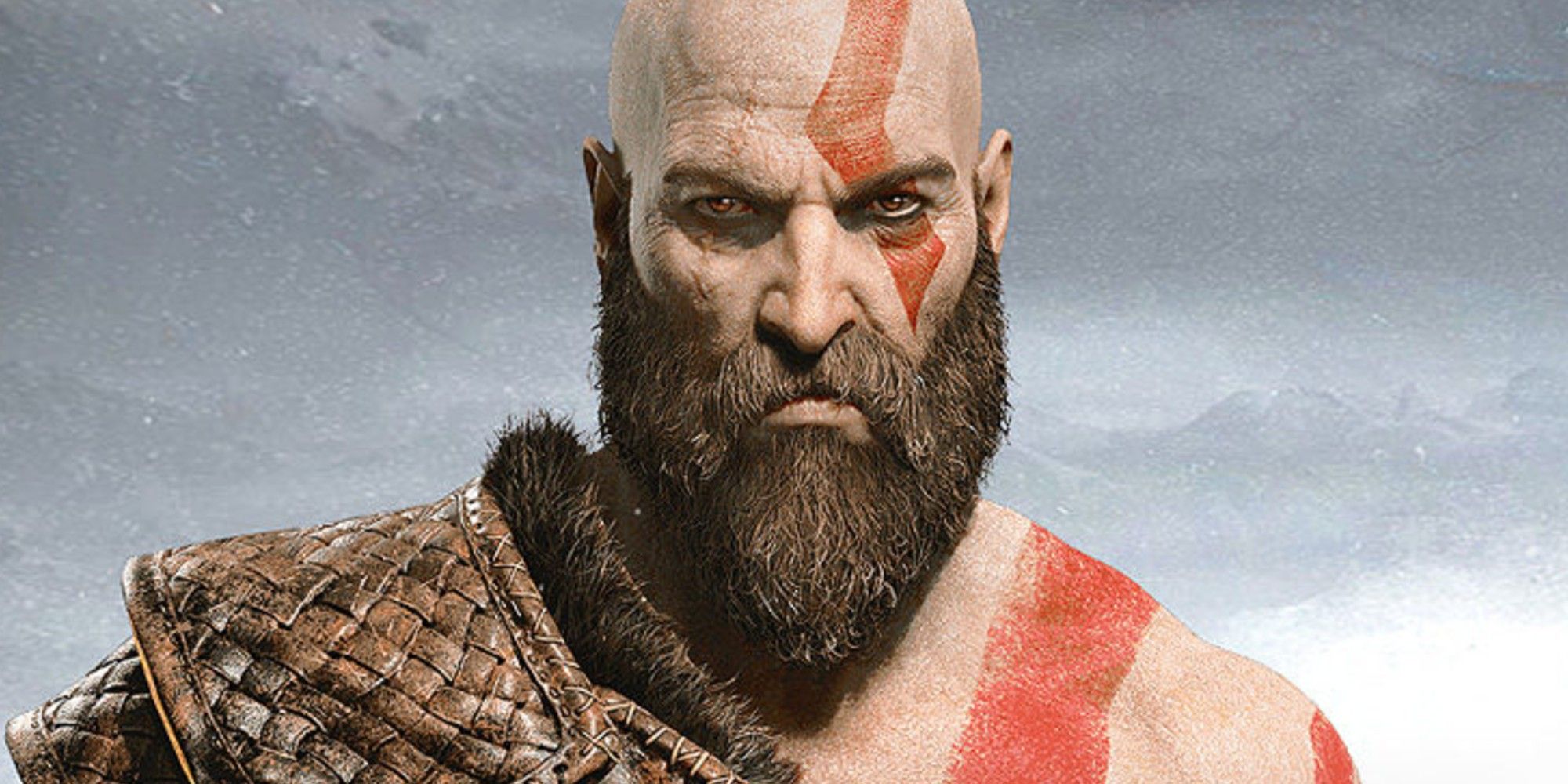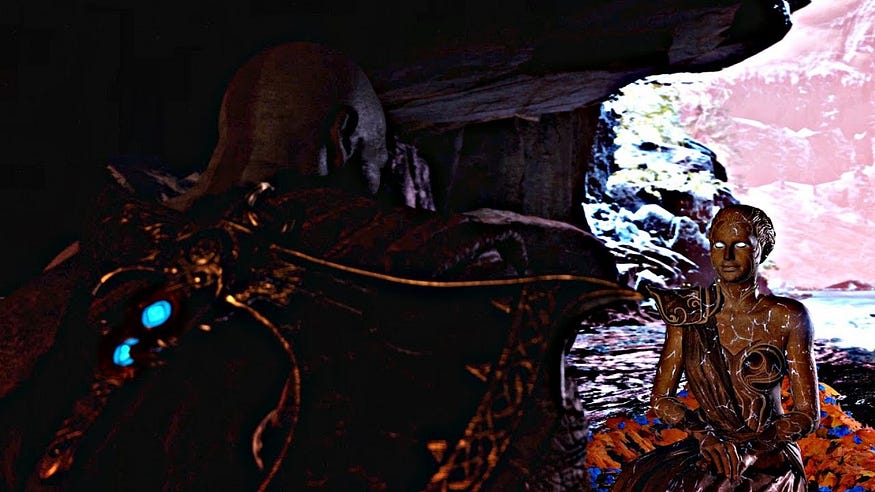Don't Discount God of War's Mythological Legacy
Past, present, and future are one

2018’s God of War spins an affecting father-son tale set against a graphically stunning Norse backdrop, paired with satisfying combat and an equally satisfying beard on Kratos.
It definitely has problems: flimsy side quests, the entire section when Kratos’ son Atreus gets all prissy about his “new” status, and the somewhat rocky transition from hack-and-slash to a more traditional RPG. (That’s not to mention Sony’s failure to notify T.C. Carson — the original voice of Kratos — that Christopher Judge would be replacing him because of motion capture requirements).
Yet overall, Santa Monica Studio did a god-like job of bringing the blood-soaked franchise to the next console generation.
There was (and is), however, an unfortunate side effect: those reveling in Kratos’ Midgardian journey began putting down his Greek odyssey— hard. Preferences are preferences, but there seemed to be a mob mentality about how superior the new game was, about how the character of Kratos and the franchise as a whole were not necessarily revitalized by it, but good for the first time because of it. It almost became “cool” to shun the old games, to call them gratuitous and immature.
I’ve loved God of War since the PS2 days — so much so that I even named my pet crawdad Kratos, calling its scrawny pincers the Blades of Chaos (I was… a weird kid). Like fans across the globe, I ate up the new game, yet the widespread condescension toward the old confused me.
Not only would 2018’s God of War not have existed without its 2005–2013 predecessors, but the latter also tell gripping stories of their own. To dismiss the Kratos of ancient Greece as nothing more than a rage machine doesn’t paint the full fresco. There may be cracks in that fresco and chips in the paint, yet the history writ there is worth contextually reconsidering.

Familial Foundations
The title menu of the first God of War is engulfed in flames. On the right side of the screen, we see half the silhouetted face of the man we’ll come to know as Kratos. Between the dour expression on his face and the raging fire — not to mention the game’s title — it’s reasonable to expect an outpouring of anger as soon as you hit “Start.” Except, when you do, you’re greeted with an ominous line that foreshadows the misery to come, delivered with the utmost resignation: “The gods of Olympus have abandoned me.”
There’s a long pause as the camera zooms out. We see that Kratos stands on a precipitous rockface, and peer into the fog below through his eyes. Then, proclaiming, “Now there is no hope,” he steps over the edge and plummets into the abyss. The depressing narration that follows doesn’t inspire confidence that he survives the fall, but just before Kratos hits the water, the game flashes back three weeks, to when the events that precipitated his suicide attempt begin.
From that opening alone, a new assumption arises: the tale of Kratos isn’t going to be so cut-and-dried as the game’s bloody aesthetic would imply — and indeed, it isn’t. The box-pushing puzzles and gratuitous sex don’t add all that much, the overarching story arc is relatively simple, and the developers take liberties galore in terms of both history and mythology. Yet in many ways, God of War falls under the same umbrella as the works of Euripides, Aeschylus, and Sophocles: ancient Greek tragedies.

Consider Collins Dictionary’s definition of Greek tragedy: “a play in which the protagonist, usually a person of importance and outstanding personal qualities, falls to disaster through the combination of a personal failing and circumstances with which he or she cannot deal.” God of War isn’t a play, but everything else fits. Kratos is “a person of importance” as an emissary of the gods and displays “outstanding personal qualities” thanks to his heritage as the son of Zeus (which he doesn’t know until the end of God of War II). When he experiences “a personal failing” on the battlefield, he swears himself to Ares and survives, but at the price of his sanity. In a blind rage, he murders his family — and is consigned to wear their ashes over his skin forevermore. When Athena won’t remove the horrid memories from his mind, he “cannot deal” with it and goes to cast himself off the cliff.
The rest of the series only continues to expand on the elements of Greek tragedy. Betrayal, madness, and setbacks prevail as Kratos pursues his revenge on Zeus, and later the entire Greek pantheon. The harder he pushes, the harder Olympus pushes back. The losses pile up. Where the god of war goes, an ocean of blood follows.
And yet, for all that blood, Kratos’ motivations always make sense. The games never shy away from crude violence, nor do they shy from moments of heart and humanity. Kratos protects a vision of his family from facsimiles of himself before Ares wrests them away. He connects with fellow Spartans, including his long-lost brother Deimos, but never for long before disaster strikes. He defies the Fates themselves to see his daughter Calliope one last time, only to realize he cannot be with her if the world is to go on.
Like Tantalus, Kratos gets so close to what he wants, yet every time, he fumbles the ball himself or has it snatched from his grasp. Either way, he’s always left with a void he doesn’t know how to fill — and as an immortal, suicide is no longer an option. The “escape from madness” he’s sought since pledging himself to Ares must instead come from within, but he has not a clue how to search himself for answers.
It all culminates in the old, bearded, axe-wielding deity we meet in 2018’s God of War.

Forward Future
Kratos has never been known for his subtlety, and so some of the ways in which the new game builds on its predecessors are equally as non-subtle. Others, surprisingly and somewhat refreshingly, you only catch if you’re really paying attention.
Subtle or not, however, what’s important is that a lot of what happened in Greece ties directly into what happens in Midgard. Indeed, the creators very clearly wanted to pay their dues to who and what came before. That’s the real reason the condescension toward Kratos’ ancient adventures baffles me so.
Take when Athena appears to him in the 2018 game. On its own, you can make some assumptions about the scene even without having played the original entries: Kratos has a complicated relationship with the goddess, but he’s ready to move on. All true, but context enhances the scene to one of the best in the series.
Athena was Kratos’ closest ally among the Olympians, ascending him to godhood after he felled Ares, but would not strip away the memories soaked with his family’s blood. She sacrifices herself to save Zeus from Kratos’ wrath, precipitating his war on Olympus in God of War III. And when the Ghost of Sparta sacrifices himself to spread the power of hope (from Pandora’s Box) to all mankind, Athena — in an ethereal state — curses him for not trusting her with that power. In the end, it seems, she treated him like a mortal even after he became a god, putting the final nail in the coffin of Kratos’ mistrust and hatred for all gods, Greek or otherwise.
That context informs not only the scene when Athena briefly returns to visit Kratos in Midgard but his attitude throughout the entire story. Why doesn’t he tell Atreus, his son, that he’s a god? Because he doesn’t want to admit that he and Atreus both are the very thing he despises. The “traditions” of godhood also press heavily on his mind: Zeus defied his father, Kronos… Kratos killed his father, Zeus… so will Atreus turn against Kratos?
The question likely won’t be definitively answered until the final game in the series, but it is acknowledged. Kratos is forced to kill Baldur, a Norse god, in front of his mother Freya, and Atreus witnesses it all. The boy wonders out loud if this is the fate of all gods, and Kratos — Kratos, the god of war, who’s slaughtered and been responsible for the deaths of countless people, gods, and monsters — tells his son that the answer is no. That they can be better.

To say Kratos has come full circle wouldn’t be true; indeed, he still has a ways to go when it comes to trust and opening his heart. But that he’s able to assure his son, a fellow god, that things will improve… is thanks to his past — thanks to the very hope he refused to grant Athena, instead bequeathing it to mankind. The future of the gods, he seems to be covertly saying, depends not only on the gods’ relationships with one another but with the world at large. They are inextricably intertwined: If the gods continue bickering, then the world will continue suffering; if the world continues suffering, then the gods will keep on bickering. No wonder circles are such prominent symbols in mythology.
Yet how to walk the path forward? After all, Kratos is still the god of war, and the games will neither erase his past nor replace his weapons with words. Not an easy question to answer, but as long as he keeps drawing on his past experiences, Kratos — along with Atreus — may just do the right thing. Or… maybe not. History does have a nasty way of repeating itself. To break the cycle would be a thing most impressive, and would no doubt require a sacrifice of some kind.
Kratos is no stranger to sacrifice, as the original games conveyed time and again. But with all he’s learned, he could ironically be the key to everything — or provide the key to Atreus. The future of God of War will be interesting, to say the least. Like Kratos, as we sally forth, let’s not discard the past so readily. There’s much we can learn from it, much we can pass on.
All the same, like Kratos, we simultaneously need to prepare ourselves to move away from the past. That can be external, as when Kratos leaves Greece behind, or internal, as when he declares that though he may always be a monster, he is chained to Athena no longer (a sentiment highlighted by the fact that, in the very same scene, he takes on the Blades of Chaos once again, which he used before she gave him both the Blades of Athena and the Blades of Exile).
Whatever we choose, it’s our duty to remain conscious of how much of ourselves we give to the past, and how much we lean forward, toward a — hopefully — better tomorrow.